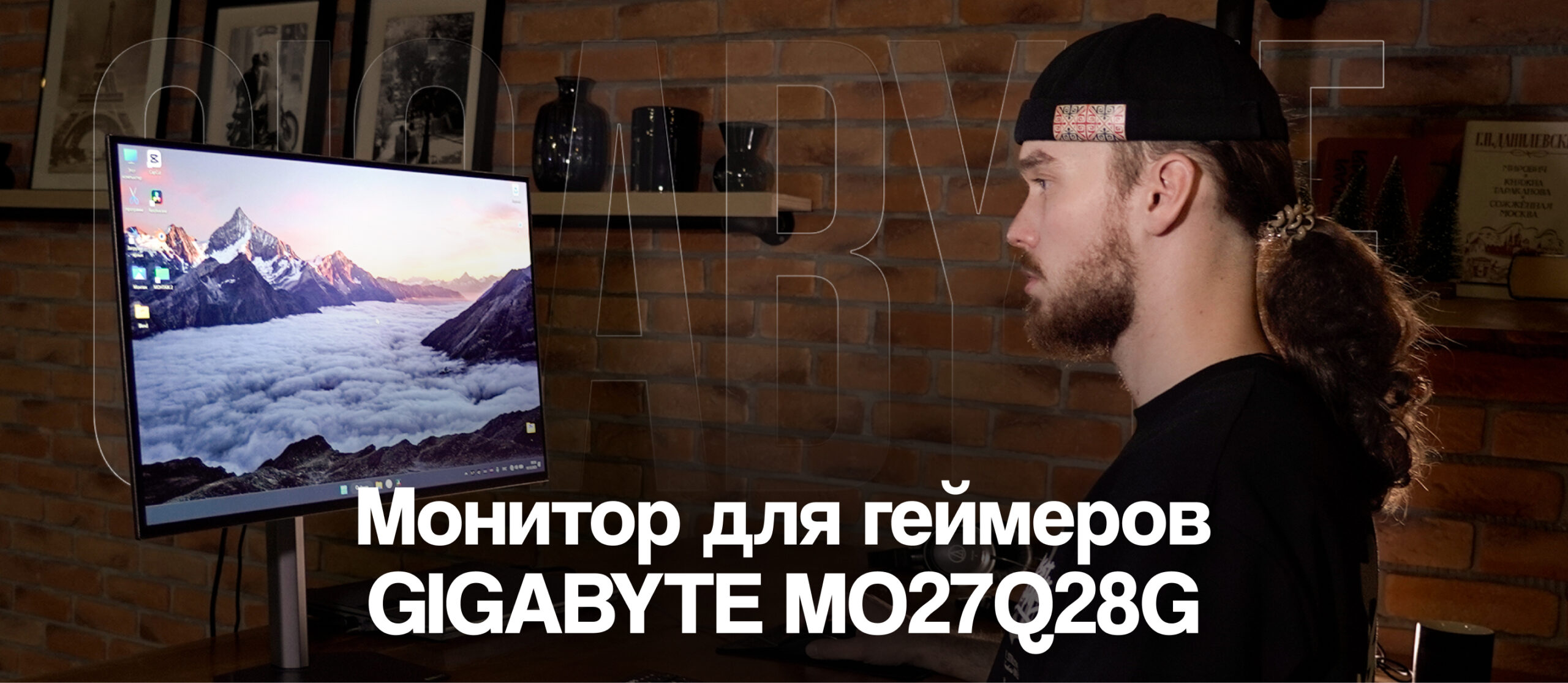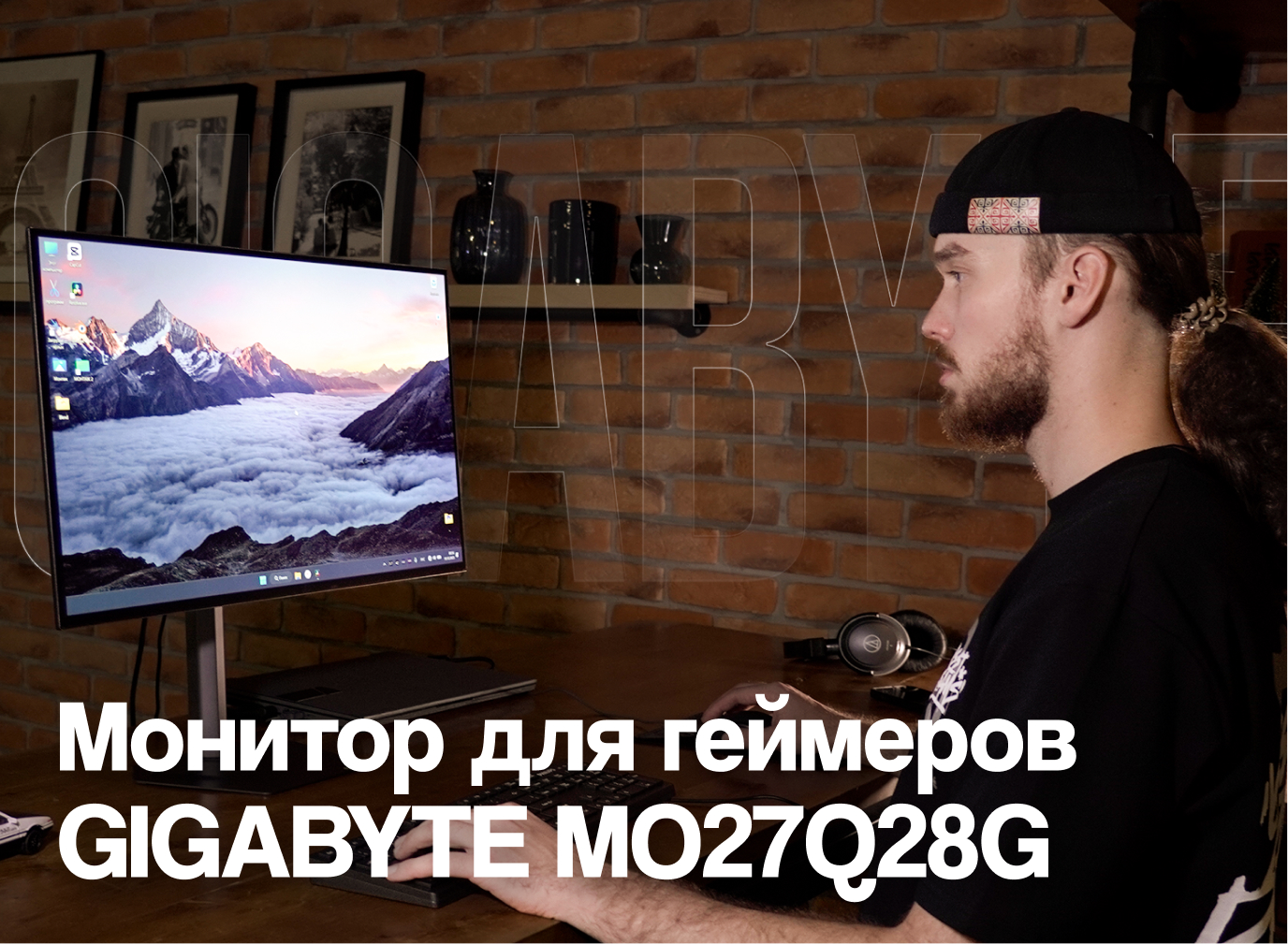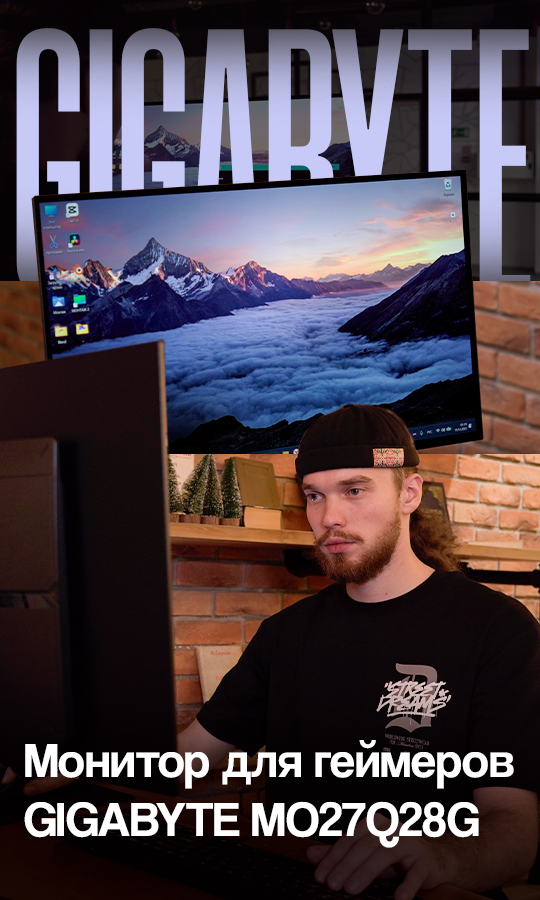Three mountain-loving friends realized that ski resorts in Kazakhstan were missing a huge opportunity to attract more visitors. This could not only boost both local and international tourism but also inspire Kazakh citizens to embrace a healthier lifestyle. Frustrated by issues with ski pass top-ups, Igor Zabolotskikh (CEO), Sergey Kim (CTO), and Nikita Oleynik (CPO) decided to take action. That’s how Resortix was born. This startup is all about enhancing the guest experience at ski resorts by making everything smoother and more intuitive. Think of it as a super-app for resorts—whether you need to buy services, make bookings, or just navigate the area, Resortix has you covered. In an interview for our "100 Startup Stories of Kazakhstan" series, the team opened up about the challenges ski resorts face and how Resortix is solving them for both users and employees.
Follow Kazakhstan’s Startup Movement in the "100 Startup Stories of Kazakhstan", a collaborative project by ER10 Media and Astana Hub. This initiative highlights the most innovative Kazakh startups, showcasing projects that stand out for their creativity and impact. Among the heroes are Astana Hub residents, as well as creators of other innovative technological products and services. The content is available in Kazakh, Russian and English.
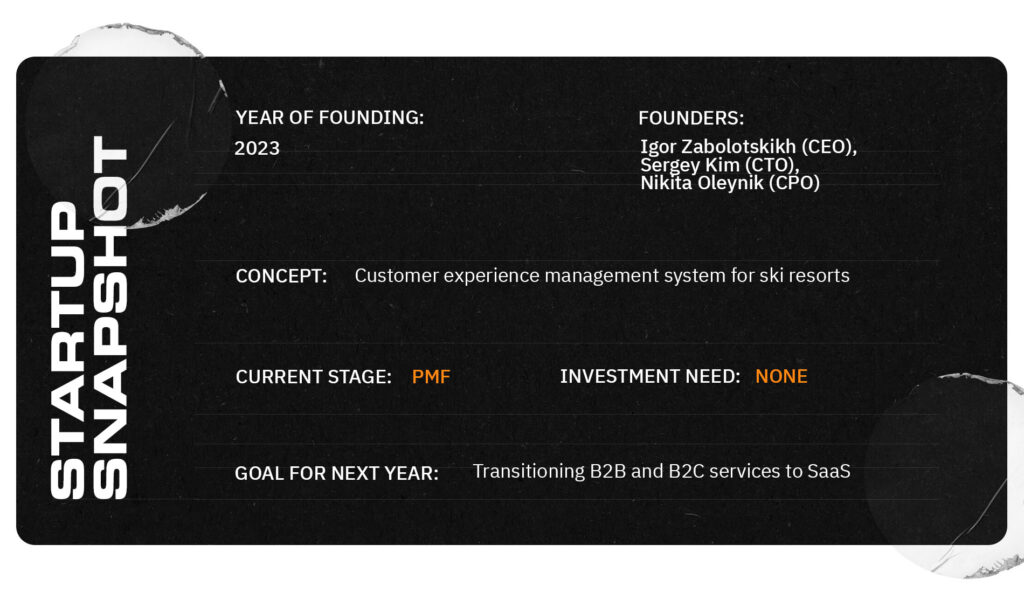
Tackling the Issues at Kazakhstani Resorts
— So, who came up with the idea to start Resortix?
Sergey: Honestly, it was kind of a natural evolution. We started out working on the "Shymbulak" project—first building it in the initial year, then developing it further in the second. As we worked, we found that we actually enjoyed automating and simplifying the process of managing a ski resort. So we thought, why not apply this experience to other resorts? The idea seemed solid, especially since there’s a key service, Axess, that we integrate with, and it has a large market. This means we could adapt our solution for other players in that space. Initially, we thought about doing individual projects, but by the third year of working on it, we realized we could turn this into a full-fledged SaaS platform that could be scaled globally. That’s when we started discussing the project as a true startup. Fun fact: Igor started working on a personal aggregator called Flexica, which later evolved into Resortix One—another startup we’re developing.
In the long run, we want to create an aggregator that includes all the resorts we’ve worked with, especially those that can’t afford their own mobile app or website. A lot of aggregators that sell entertainment services don’t offer anything unique for skiing or active recreation in general. But you have to realize that users need insurance—a separate service—especially for activities like paragliding, diving, or anything else where safety is a concern. That’s where we can come in with unique features, creating a specialized aggregator for various resorts and active sports.
It’s hard to pinpoint whether the idea for Resortix came from Igor or me—it was more of a group effort. We had lots of discussions within the team and got feedback from our startup friends who encouraged us to focus on what we’re good at and enjoy. Those insights led us to zero in on the startup, join the Smart City acceleration program by MOST Business Intelligence, and now we’re pushing forward with grants and other programs.
— Why focus on ski resorts? Why start with the Shymbulak project?
Igor: We were skiing there ourselves and kept running into the same issues—standing in long lines in the freezing cold or dealing with the hassle of topping up ski passes using outdated services. One day, while riding the gondola, we started tossing around ideas: "What if we could fix this?"
Outdated Systems Holding Resorts Back

— What was the biggest pain point you found at these ski resorts?
Sergey: Communication with users was a huge issue. People didn’t understand the difference between a pedestrian ticket to Combi-1 and Combi-2, or how to get to the 3200-meter summit. The price difference was significant, and many bought the cheaper ticket only to be turned away at the summit, leading to frustration and complaints like, "Why are you deceiving me?"
Another big problem was the way the products were visualized—most were running on WordPress, various PHP projects, or even Tilda. They couldn’t scale efficiently, lacked a unified system for creating pages, and had analytics in one place, messengers in another, and communication channels elsewhere. When it came time to make a payment or transfer rights, people were overwhelmed by having to manage multiple resources without knowing how to deal with them. Our solution gave them a tool to manage everything in one place, including sending push notifications.
Igor: From a business standpoint, we introduced a loyalty program, which didn’t exist before, except for seasonal ski passes or discounted rates. We added gamification to reward users who spend a little more or make frequent purchases—like, "ski three times and earn bonuses." At Oi Qaragai, for example, there’s a flexible loyalty system where the cashback percentage increases based on the user’s status. We made the buying process more engaging and convenient, encouraging people to spend more at the resort.
Another major issue was that 95% of visitors didn’t return. The resort had no idea who these people were, when their birthdays were, or how to engage them. They couldn’t even send a simple message like, "Hey, it’s been a while, why not come back and enjoy a discount?" In short, there were no tools for keeping in touch with inactive users.
Bringing the Resort to Your Smartphone
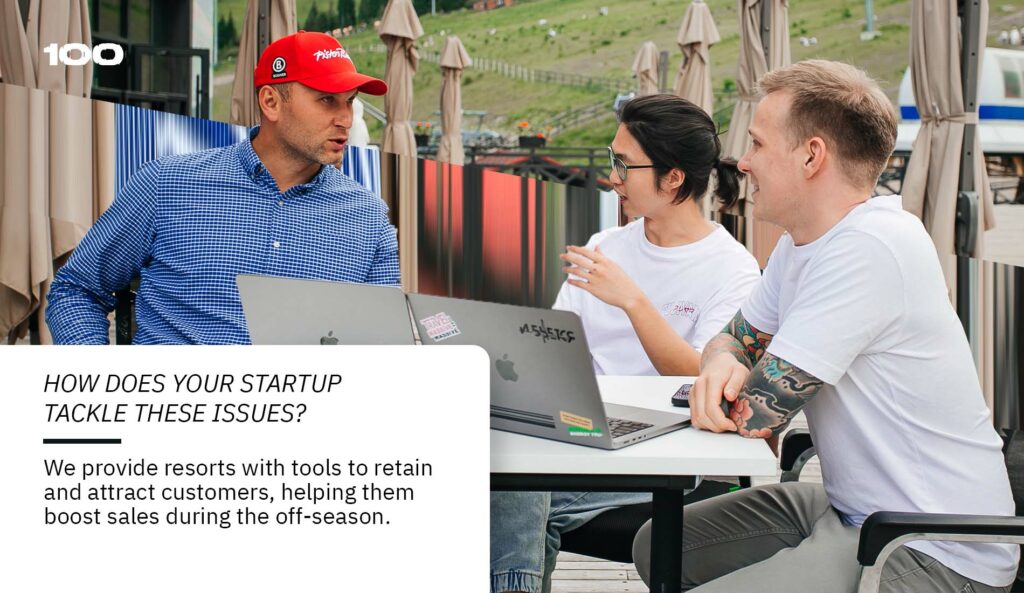
— How does your startup tackle these issues?
Igor: We provide resorts with tools to retain and attract customers, helping them boost sales during the off-season. Guests, in turn, always have access to up-to-date information and services through their smartphone, along with continuous service improvements driven by feedback.
— Where is your startup at right now?
Sergey: We’re currently in the product-market fit stage. We already have a large sales and customer experience management system for ski resorts, but we’re aiming to create a unified network of resorts to organize international tourism for both Kazakhstani citizens and people from neighboring countries. We’re also in talks with the "Oi Qaragai" resort to create and sell tours for foreign tourists. As I mentioned, we’re working on our own aggregator, Resortix One. Plus, we’re exploring the possibility of integrating an AI consultant into our app—so if you’re new to skiing and don’t know where to start, the consultant will guide you step by step.
Staying Ahead of the Competition
— How do you set yourselves apart from competitors?
Nikita: We can get online sales up and running for all resort services in record time. This is crucial because when the season starts and demand is high, businesses can’t afford mistakes or long development times. Our pilot launches have shown that our solution has a much higher conversion rate than similar off-the-shelf products from other vendors.
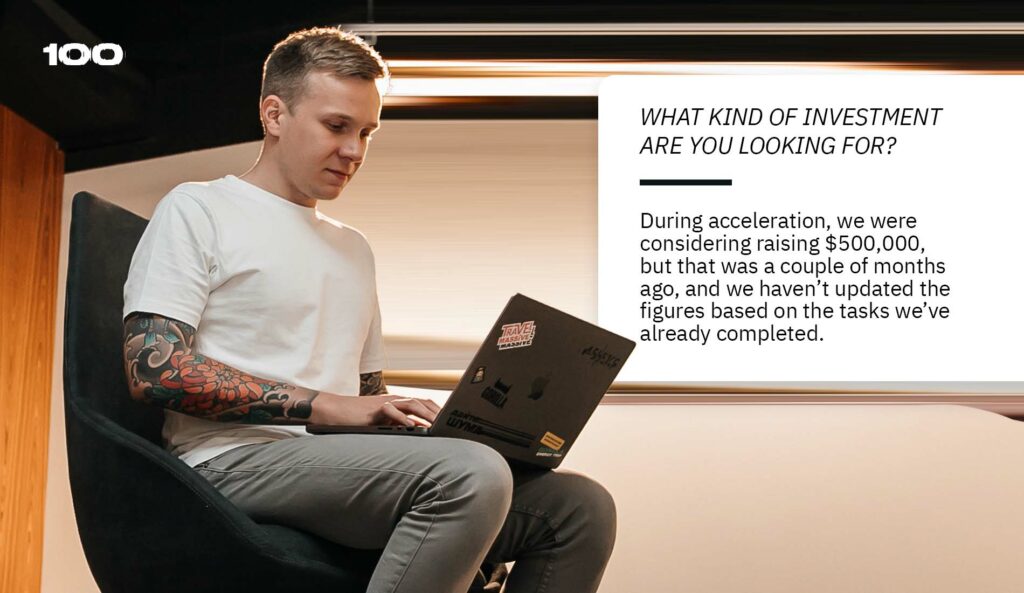
— What kind of investment are you looking for?
Igor: During acceleration, we were considering raising $500,000, but that was a couple of months ago, and we haven’t updated the figures based on the tasks we’ve already completed. Investments could help us roll out the SaaS version faster and enter foreign markets more confidently, while also developing solutions for partners and travel agents interested in selling their services.
—Are you planning to scale? If so, which markets are you targeting?
Nikita: We’re in the process of developing a B2B portal for resort partners. This will allow us to dig deeper into the market and offer even more to tourists. Right now, we’re active in Kazakhstan, Russia, Uzbekistan, and Azerbaijan, and we’re negotiating with resorts in Georgia. In the near future, we plan to expand into Kyrgyzstan, Turkey, and Europe.
On the Path to a Billion-Dollar Valuation

— Do you think you have a shot at becoming a global unicorn?
Igor: I started seriously considering it when I realized that a "unicorn" is a company valued at $1 billion, and our market is currently valued at $16 billion. We’re exploring ways to reach that valuation, maybe by entering other markets and expanding our customer base with the product Sergey mentioned. Right now, we’re focused on winter sports—snowboarding, ski tourism, and the like. But if we branch out into regular hiking, camping, and summer mountain activities, the market size jumps to $30 billion. Add in surf camps, windsurfing, and other summer sports, and we’ll be well on our way to that billion-dollar mark by becoming purveyors of experiences and new adventures.
— Ideally, how soon do you want to hit that billion-dollar valuation?
Igor: Ideally, within three years.
— What’s the ultimate goal of your startup?
Igor: We want to make active outdoor activities more accessible and bring together people who share the same passion. It’s exciting to unite people with the same interests and give them the tools to make it easier and more enjoyable.
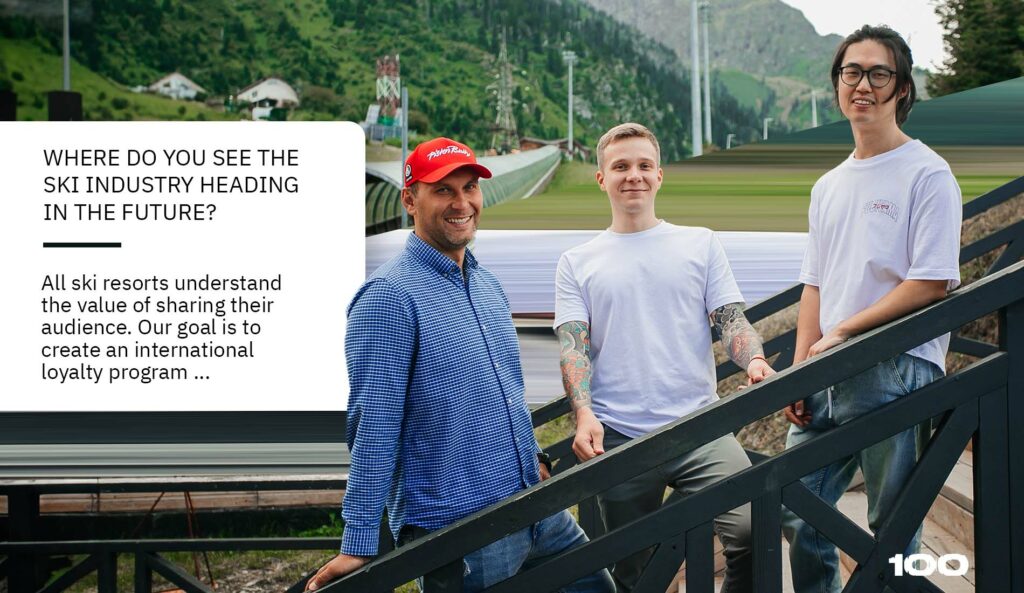
— Where do you see the ski industry heading in the future?
Nikita: We don’t just see it; we know it, and we’re moving in that direction. All ski resorts understand the value of sharing their audience. Our goal is to create an international loyalty program where you can visit Courchevel once, earn significant cashback, and then spend it wherever you like. The more we dive into our product, the more we realize that technology is just one piece of the puzzle—effective usage is another. We thought that giving ski resorts a super-tool would immediately solve all their problems, but a lot of people are used to doing things the old way. For instance, one of our clients had special offers, and when I asked the sales department via WhatsApp how to buy them, they told me to come to the resort and pay at the ticket office—even though they could have just sent a payment link from the website. That’s why we’re moving toward a transactional monetization model that allows us to keep improving the service and product by regularly working with customer analytics and all stakeholders in the niche.
— So your app helps resorts become more digital?
Igor: Absolutely! This enables ski resorts to attract clients more effectively and boost their revenue by optimizing marketing budgets and paying for results. As a result, the quality of content, service, and guest information will improve.



